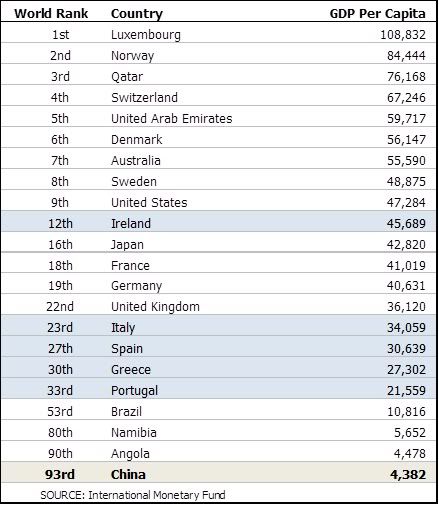“May you live in interesting times” is purported to be the English translation of an ancient Chinese proverb. However, the translation is misleading. Taken from the original Chinese text, scholars believe the term “interesting” is more correctly translated as chaotic, or tumultuous, and the phrase was not a proverb, but was considered a curse.
I think it’s fair to describe our current times as “interesting,” and there is a related story this week that is worth reflecting upon. Chinese Premier Wen Jiabao delivered the keynote speech at an annual meeting of the World Economic Forum and he addressed a number of questions in a subsequent press conference. Wen suggested that China may be willing to lend a hand (or, more specifically, lend billions of euros) in order to help the troubled European economies that continue to work toward lasting resolution of their financial problems.
Bloomberg reported on Wen’s statements, quoting him as follows:
“We have on many occasions expressed our readiness to extend a helping hand, and our readiness to increase our investment in Europe,” Wen said. At the same time, “they [European Nations] should recognize China’s full market economy status” before the 2016 deadline set by the World Trade Organization. “To show one’s sincerity on this issue a few years ahead of that time is the way a friend treats another friend,” he said.
First of all, there would be significant benefits for China if it were classified as a “market economy” rather than a “non-market economy” as it is presently considered. Under the rules of the World Trade Organization, recognizing China as a market economy would make it very difficult for Europe to impose tariffs and trade restrictions on cheap Chinese products.
Here is why I believe this situation is so interesting: despite having one of the largest and fastest growing economies, China is still one of the poorest nations on earth. As you can see from the table that follows, China ranks 93rd in the world in terms of GDP per capita and actually ranks below Namibia and Angola (but slightly higher than Turkmenistan and Guatemala, which are not shown in the table). As a result of having such a low GDP per capital, China obviously ranks very low in terms of income per capita and consequently the average Chinese citizen has a very low standard of living. Nonetheless, China now finds itself in a unique position of leverage with the financially-hobbled European countries.
Note the European countries (blue shading) that are at the heart of the current debt crisis: Portugal, Italy, Ireland, Greece, and Spain. On average, these five countries have a GDP per capita that is 7 times greater than that of China! I think it’s safe to say that we do indeed live in “interesting times” when we face a situation in which one of the poorest countries on earth is among the only nations with sufficient savings and currency reserves to assist some of the wealthiest nations.
As you probably know, China is already the largest foreign creditor to the United States, holding more U.S. treasury securities than any other nation. Now, despite having one of the lowest standards of living on earth, China is a nation that could soon play a constructive role in the European debt crises, presumably by buying tens of billions worth of euro-denominated sovereign bonds.
As Henry Kissinger wrote in his recent book, On China:
“China’s [diplomatic] strategy generally exhibits three characteristics: meticulous analysis of long-term trends, careful study of tactical options, and detached exploration of operational decisions.”
We are witnessing this diplomatic strategy in action. China is gradually ascending to a prominent role on the global stage as she evaluates various tactical options and makes the operational decisions to gain economic leverage and political influence. Despite being one of the poorest countries on earth, China may be the only country, outside of the European Union, that has the willingness and ability to help the Europeans resolve their own financial problems. Of course, there is one small string attached to Wen’s offer of assistance, but friends don’t need trade restrictions against friends, do they? Interesting times indeed.
Ian McAbeer is the President of Blackhaw Wealth Management, a Financial Advisor and Registered Investment Advisor providing portfolio management services to individuals, families, trusts and foundations. If you enjoyed this article please explore our website to see our past publications and to sign up for our financial blog.


Post new comment
Please Register or Login to post new comment.